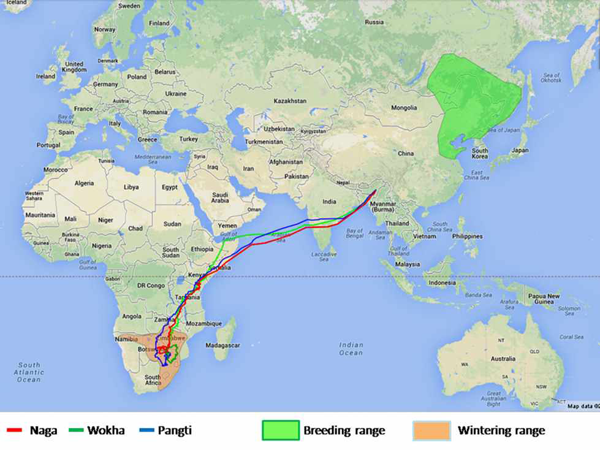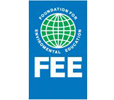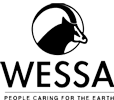
Centre for Environment Education (CEE) with Foundation for Environmental Education (FEE) and members – Information and Training Centre for Nature and Environment in Mongolia and Wildlife and Environment Society of South Africa (WESSA) in South Africa, presents a pilot initiative ‘GCS Wild Flight’ collaborating with Eco-Schools in India, Mongolia and South Africa, with a focus on the Amur Falcon.
The GCS Wild Flight initiative would involve Eco-Schools from the three countries through E-Twinning in the process of discovering and learning about these interesting birds, their migratory pattern, life cycles, conservation challenges and stories associated with them.

About Amur Falcon
The Amur Falcons are fascinating migratory raptors who make the 22,000 km voyage from breeding grounds in Russia and China across India to winter in Southern Africa. A lot remains to be discovered about this species. GCS Wild Flight with the help of E-twinning between Eco-Schools in India, Mongolia and South Africa will focus on migration of Amur Falcon through these three countries.
Our Aim
The initiative aims to involve middle school students from 6 Eco-schools (two each from India, Mongolia and South Africa respectively), connecting them on this theme, providing them with an opportunity to learn about bird migration and associated sustainability challenges with a focus on the Amur Falcon. It would establish communication and exchange between these school-communities through involvement in a common journey of learning.
Map Source:https://www.conservationindia.org/articles/tracking-the-incredible-journey-of-the-amur-falcon
| South Africa |
|
India |
|
Mongolia |
| |
|
|
|
|
| |
|
|
|
|
Our 7 Step Methodology
GCS Wild Flight would follow ‘The 7 steps methodology’ of the Eco-Schools. The 7 steps follow a process from exploring issues to finding solutions and taking local action. The core team from FEE and the three organisations will prepare and share with schools, a list of questions that they would be expected to address and some ideas on possible projects. It is planned that, along with individual reports from these three countries, a common report showcasing GCS Wild Flight as a model project on E-twinning would be prepared. This would be showcased as a good action research project. At least three meetings between the schools would be expected during the project time frame. These could be timed with when the Falcons are there in each country.
Eco-schools Partnership
Each country partner/National Operator would bring to this partnership, local knowledge and engagement with communities working on this aspect. Possibility of working out partnerships with wildlife and education experts, who have worked on this species, is being explored. FEE Eco-Schools secretariat would look for funding opportunity building on the pilot initiative into a larger program that provides learning opportunities through E-twinning among Eco-schools.
We look forward to launch this initative jointly with UNEP, at the Convention on the Conservation of Migratory Species of Wild Animals (CMS) COP 13 (15-22 February, 2020) in Gandhinagar, Gujarat, India. (https://www.cms.int/en/legalinstrument/cms.)
Partnering Organisations





About GCS
CEE's Global Citizenship for Sustainability (GCS) is an interactive school education programme which offers an exciting and challenging opportunity for students to work on sustainability issues and build leadership and problem solving skills. It connects schools on a global level to work on common sustainability issues through a specially developed and successfully tested methodology. The GCS process seeks to prioritize values education, the building of partnerships as well as innovative ways of pooling resources and involving students in solving community issues through fostering ownership and personal relationships.
The initiative was launched during the UN Decade of Education for Sustainability Development (UNDESD) to encourage and support the practical teaching of Education for Sustainability in schools of Australia and India. The first two phases of the GCS were successfully implemented in India and Australia with support from the Commonwealth Departments of Environment and Education as well as State and local government agencies in India and Australia.
The Global Education First Initiative (GEFI) launched by the United Nations specifically highlights the role of education in fostering global citizenship. Launched by the UN Secretary-General, the GEFI recognises that, ‘Education must fully assume its central role in helping people to forge a more just, peaceful, tolerant and inclusive societies. It must give people the understanding, skills and values they need to cooperate in resolving the interconnected challenges of the 21st century.’
Contact Person Details:
| SOUTH AFRICA |
|
INDIA |
|
MONGOLIA |
|
Wildlife and Environment Society of South Africa
National Operator: Cindy-Lee Cloete
Mail: [email protected]
|
|
Centre for Environment Education
National Operator: Madhavi Joshi and Khushbu shah
Mail: [email protected], [email protected]
|
|
Information and Training Center for Nature and Environment
National Operator: Shinetsetseg Erdenebayar
Mail: [email protected]
|